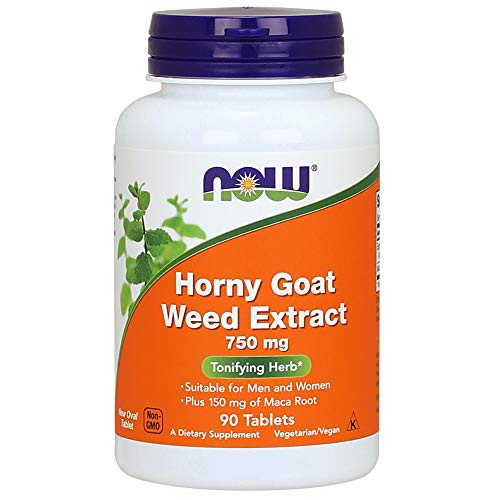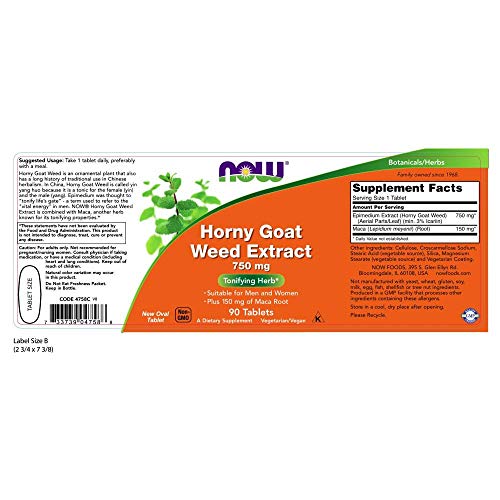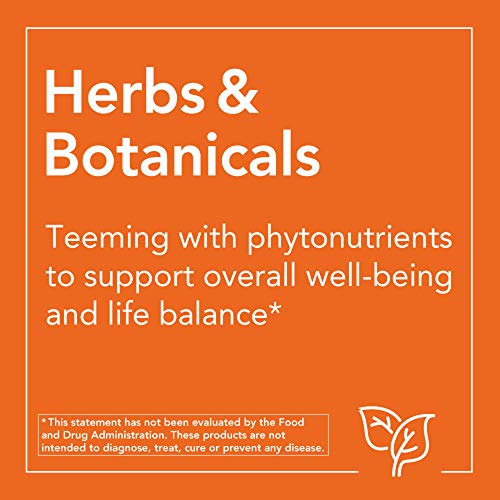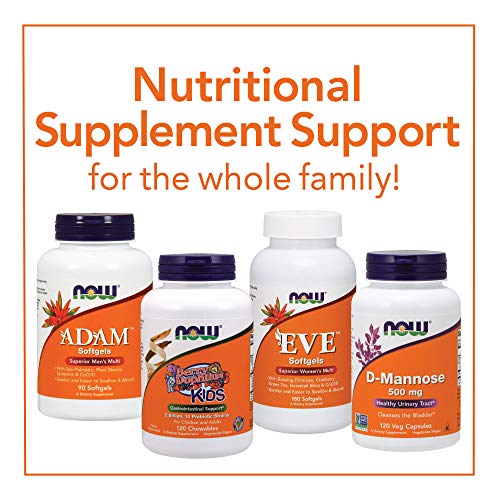



NOW Foods Herbal Supplement - Supports Vitality, GMP Quality - Horny Goat Weed 750mg, 90 Tablets


Triticum Vulgare (Wheat) Gluten
Medium RiskTriticum vulgare (wheat) gluten is a protein derived from wheat that functions primarily as a binding agent in various food and cosmetic products. It provides texture and elasticity, making it a common ingredient in baked goods and some personal care items.
Sustai Insights
Wheat gluten offers functional benefits such as enhancing product texture and acting as a stabilizer. However, it poses moderate allergenic risks, particularly for individuals with gluten sensitivity or celiac disease. Environmental concerns are low, with no significant pollutant potential noted. Regulatory bodies do not impose major restrictions, but products must be clearly labeled for consumer safety. Overall, the risk level is assessed as medium. Safe usage practices should be observed, especially for sensitive populations, and alternatives like pea protein or other plant-based binders may be considered.
Stearic Acid
Low RiskStearic acid is a naturally occurring fatty acid commonly found in animal and vegetable fats. It functions primarily as an emulsifier, thickener, and stabilizer in cosmetic and personal care products, providing texture and consistency.
Sustai Insights
Stearic acid offers functional benefits such as effective emulsification and stabilization of formulations. It is derived from renewable sources and is biodegradable, contributing to its sustainability profile. Health risks are low, with minimal concerns regarding carcinogenicity, allergies, or reproductive toxicity. Environmental risks are also low, with no significant pollutants or bioaccumulation concerns noted. Regulatory bodies, including the FDA, do not impose restrictions on its use. Overall, stearic acid is assessed as low risk, and its safe usage practices are well-established, with no significant alternatives needed.
Cellulose
Low RiskCellulose is a natural polysaccharide derived from plant cell walls, primarily used as a thickening agent, stabilizer, and emulsifier in cosmetic formulations. It is known for its ability to improve texture and consistency in products.
Sustai Insights
Cellulose serves as an effective thickening and stabilizing agent, enhancing product texture while being biodegradable and derived from renewable sources. Health risks are minimal, with low concerns regarding carcinogenicity, allergies, and reproductive toxicity. Environmental impacts are also low, as cellulose does not contribute significantly to pollution or bioaccumulation. Regulatory agencies have not issued restrictions on its use. Overall, cellulose presents a low risk profile, making it a suitable ingredient choice in cosmetics.
Egg
Low RiskEgg is the entire content of chicken eggs, commonly used as an ingredient in various products for its nutritional and functional properties.
Sustai Insights
Eggs are known for their functional benefits, including serving as a binding agent and providing protein. They are typically sustainably sourced and biodegradable. Health risks are considered low, with minimal concerns regarding carcinogenicity, allergies, or reproductive toxicity. Environmental risks are also low, with no significant pollutant potential. Regulatory bodies do not impose current restrictions on egg usage. Overall, the risk level is low, and safe usage practices should be observed, though alternatives like plant-based substitutes may be considered for those with allergies.
Magnesium Stearate
Low RiskMagnesium stearate is a magnesium salt of stearic acid, commonly used as a lubricant and anti-caking agent in pharmaceuticals and cosmetic products. It helps in the manufacturing process by preventing ingredients from clumping together and ensuring even distribution in formulations.
Sustai Insights
Magnesium stearate is recognized for its functional benefits as a lubricant and anti-caking agent, enhancing product stability. It is considered low risk regarding health concerns, including carcinogenicity and allergenic potential, with no significant environmental hazards reported. Regulatory bodies, including the FDA, have not imposed major restrictions, supporting its safe use in various applications. Recommended usage levels are typically low, maintaining safety in formulations. Overall, the ingredient is assessed as low risk, with no significant adverse health or environmental impacts identified.
Sand
Low RiskSand is loose, granular particles of worn or disintegrated rock, primarily composed of silica. It is commonly used as an abrasive, filler, or in construction and landscaping for its structural properties.
Sustai Insights
Sand offers functional benefits such as providing bulk and texture in various products, and it is generally considered to have low health risks, with minimal concerns regarding carcinogenicity, allergies, or reproductive toxicity. Environmentally, sand does not contribute significantly to pollution and is not bioaccumulative. Regulatory bodies do not impose restrictions on sand usage, maintaining its low-risk status. Safe usage practices should be followed to avoid inhalation of fine particles. Overall, sand is a low-risk ingredient with no notable negative impacts.
Milk
Low RiskMilk is whole milk from cows, primarily used as a source of nutrition and an ingredient in various food products. It contains proteins, fats, carbohydrates, vitamins, and minerals, contributing to its functional benefits in culinary applications.
Sustai Insights
Milk provides essential nutrients and serves as a versatile ingredient in food, enhancing flavor, texture, and nutritional value. It is generally regarded as safe with low concerns for carcinogenicity, allergies, or developmental toxicity. Environmental risks are minimal, and regulatory bodies impose no significant warnings. However, individuals with lactose intolerance or dairy allergies should exercise caution. Overall, milk is assessed as low risk based on current scientific consensus.
Triticum Vulgare (Wheat)
Low RiskTriticum vulgare, commonly known as wheat, is a cereal grain primarily used in food products and various cosmetic formulations. It serves as a source of carbohydrates and can also function as a binding agent, thickener, or emulsifier in formulations. Wheat is widely recognized for its role in nutrition and its diverse applications in the food industry.
Sustai Insights
Triticum vulgare offers functional benefits as a binding agent and source of carbohydrates, with sustainable attributes if sourced responsibly. Health risks are low, with minimal concerns regarding carcinogenicity, allergies, or reproductive toxicity. Environmental risks, including pollution potential, are also low. Regulatory bodies do not currently impose restrictions on its use. Overall, the risk level associated with this ingredient is low, making it a safe choice for both consumers and the environment.
Stearic Acid
Low RiskStearic acid is a naturally occurring fatty acid commonly found in animal and vegetable fats. It functions primarily as an emulsifier, thickener, and stabilizer in cosmetic and personal care products, providing texture and consistency.
Sustai Insights
Stearic acid offers functional benefits such as effective emulsification and stabilization of formulations. It is derived from renewable sources and is biodegradable, contributing to its sustainability profile. Health risks are low, with minimal concerns regarding carcinogenicity, allergies, or reproductive toxicity. Environmental risks are also low, with no significant pollutants or bioaccumulation concerns noted. Regulatory bodies, including the FDA, do not impose restrictions on its use. Overall, stearic acid is assessed as low risk, and its safe usage practices are well-established, with no significant alternatives needed.
Cellulose
Low RiskCellulose is a natural polysaccharide derived from plant cell walls, primarily used as a thickening agent, stabilizer, and emulsifier in cosmetic formulations. It is known for its ability to improve texture and consistency in products.
Sustai Insights
Cellulose serves as an effective thickening and stabilizing agent, enhancing product texture while being biodegradable and derived from renewable sources. Health risks are minimal, with low concerns regarding carcinogenicity, allergies, and reproductive toxicity. Environmental impacts are also low, as cellulose does not contribute significantly to pollution or bioaccumulation. Regulatory agencies have not issued restrictions on its use. Overall, cellulose presents a low risk profile, making it a suitable ingredient choice in cosmetics.
Egg
Low RiskEgg is the entire content of chicken eggs, commonly used as an ingredient in various products for its nutritional and functional properties.
Sustai Insights
Eggs are known for their functional benefits, including serving as a binding agent and providing protein. They are typically sustainably sourced and biodegradable. Health risks are considered low, with minimal concerns regarding carcinogenicity, allergies, or reproductive toxicity. Environmental risks are also low, with no significant pollutant potential. Regulatory bodies do not impose current restrictions on egg usage. Overall, the risk level is low, and safe usage practices should be observed, though alternatives like plant-based substitutes may be considered for those with allergies.
Magnesium Stearate
Low RiskMagnesium stearate is a magnesium salt of stearic acid, commonly used as a lubricant and anti-caking agent in pharmaceuticals and cosmetic products. It helps in the manufacturing process by preventing ingredients from clumping together and ensuring even distribution in formulations.
Sustai Insights
Magnesium stearate is recognized for its functional benefits as a lubricant and anti-caking agent, enhancing product stability. It is considered low risk regarding health concerns, including carcinogenicity and allergenic potential, with no significant environmental hazards reported. Regulatory bodies, including the FDA, have not imposed major restrictions, supporting its safe use in various applications. Recommended usage levels are typically low, maintaining safety in formulations. Overall, the ingredient is assessed as low risk, with no significant adverse health or environmental impacts identified.
Sand
Low RiskSand is loose, granular particles of worn or disintegrated rock, primarily composed of silica. It is commonly used as an abrasive, filler, or in construction and landscaping for its structural properties.
Sustai Insights
Sand offers functional benefits such as providing bulk and texture in various products, and it is generally considered to have low health risks, with minimal concerns regarding carcinogenicity, allergies, or reproductive toxicity. Environmentally, sand does not contribute significantly to pollution and is not bioaccumulative. Regulatory bodies do not impose restrictions on sand usage, maintaining its low-risk status. Safe usage practices should be followed to avoid inhalation of fine particles. Overall, sand is a low-risk ingredient with no notable negative impacts.
Triticum Vulgare (Wheat) Gluten
Medium RiskTriticum vulgare (wheat) gluten is a protein derived from wheat that functions primarily as a binding agent in various food and cosmetic products. It provides texture and elasticity, making it a common ingredient in baked goods and some personal care items.
Sustai Insights
Wheat gluten offers functional benefits such as enhancing product texture and acting as a stabilizer. However, it poses moderate allergenic risks, particularly for individuals with gluten sensitivity or celiac disease. Environmental concerns are low, with no significant pollutant potential noted. Regulatory bodies do not impose major restrictions, but products must be clearly labeled for consumer safety. Overall, the risk level is assessed as medium. Safe usage practices should be observed, especially for sensitive populations, and alternatives like pea protein or other plant-based binders may be considered.
Milk
Low RiskMilk is whole milk from cows, primarily used as a source of nutrition and an ingredient in various food products. It contains proteins, fats, carbohydrates, vitamins, and minerals, contributing to its functional benefits in culinary applications.
Sustai Insights
Milk provides essential nutrients and serves as a versatile ingredient in food, enhancing flavor, texture, and nutritional value. It is generally regarded as safe with low concerns for carcinogenicity, allergies, or developmental toxicity. Environmental risks are minimal, and regulatory bodies impose no significant warnings. However, individuals with lactose intolerance or dairy allergies should exercise caution. Overall, milk is assessed as low risk based on current scientific consensus.
Triticum Vulgare (Wheat)
Low RiskTriticum vulgare, commonly known as wheat, is a cereal grain primarily used in food products and various cosmetic formulations. It serves as a source of carbohydrates and can also function as a binding agent, thickener, or emulsifier in formulations. Wheat is widely recognized for its role in nutrition and its diverse applications in the food industry.
Sustai Insights
Triticum vulgare offers functional benefits as a binding agent and source of carbohydrates, with sustainable attributes if sourced responsibly. Health risks are low, with minimal concerns regarding carcinogenicity, allergies, or reproductive toxicity. Environmental risks, including pollution potential, are also low. Regulatory bodies do not currently impose restrictions on its use. Overall, the risk level associated with this ingredient is low, making it a safe choice for both consumers and the environment.
Discover NOW Foods Horny Goat Weed, a premium herbal supplement designed to support overall wellness for both men and women. Each tablet delivers 750 mg of this tonifying herb, complemented by 150 mg of Maca Root for enhanced vitality. Crafted in a GMP-certified facility, this dietary supplement ensures quality, free from common allergens like gluten and dairy.
- Supports Vitality: Horny Goat Weed is known for its potential to enhance energy and promote overall vitality.
- Balanced Formula: Infused with Maca Root, this blend supports hormonal balance and overall well-being.
- Quality Assurance: Manufactured in a GMP facility, ensuring high-quality standards and safety.
- Convenient Daily Use: Easy to incorporate into your routine with just one tablet a day, preferably with a meal.
- Allergen-Free: Formulated without yeast, gluten, and other allergens, making it suitable for various dietary needs.
Subscribe & Save with Sustai
- Best Price Guarantee: Always enjoy the lowest prices on sustainable home essentials.
- No Surprises: We’ll notify you before shipping. No hidden fees, ever.
- You’re in Charge: Change, pause, or cancel your subscription anytime with ease.
- Eco-Friendly Deliveries: Our grouped shipments mean less packaging and lower emissions.
Join us on a sustainable journey. Special offers for a limited time! Prices and promotions may change.
Recommended Products
Discover NOW Foods Horny Goat Weed, a premium herbal supplement designed to support overall wellness for both men and women. Each tablet delivers 750 mg of this tonifying herb, complemented by 150 mg of Maca Root for enhanced vitality. Crafted in a GMP-certified facility, this dietary supplement ensures quality, free from common allergens like gluten and dairy.
- Supports Vitality: Horny Goat Weed is known for its potential to enhance energy and promote overall vitality.
- Balanced Formula: Infused with Maca Root, this blend supports hormonal balance and overall well-being.
- Quality Assurance: Manufactured in a GMP facility, ensuring high-quality standards and safety.
- Convenient Daily Use: Easy to incorporate into your routine with just one tablet a day, preferably with a meal.
- Allergen-Free: Formulated without yeast, gluten, and other allergens, making it suitable for various dietary needs.

You can have at most 2 Sustainable Steals products in your cart
Customer Reviews
Customers’ View
Customers appreciate the effectiveness and energizing properties of this herbal supplement. Many users report that the Maca Root formulation enhances energy levels and stamina, contributing positively to overall health. One customer noted, "It wakes me up in the morning and keeps me focused throughout the day." Additionally, the product's sterol content is praised for its benefits, including support for capillary health and mild enhancement effects. While some customers express mixed views on its value for money, others believe they receive quality at a reasonable price. Overall, users find this supplement beneficial in their wellness journey, aligning with their health-conscious and eco-friendly values.
AI-generated from the text of customer reviewsThis product is rated 5.0 of 5.0 stars.
It has received 3 reviews.




